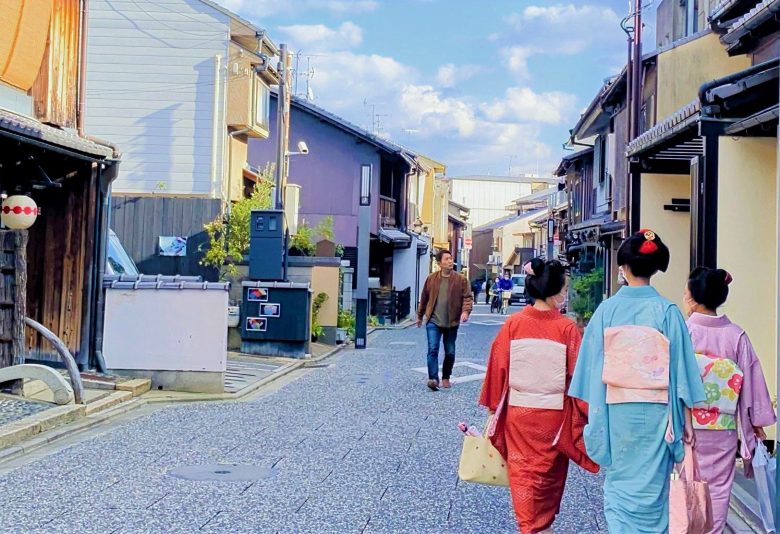
Vivre dans les traditions japonaises : Enkyoku
L'un des plus grands avantages d'un séjour à Tokyo ou à Kyoto, au Japon, est celui d'interagir avec les locaux. Que ce soit en tant qu'étudiants en langues étrangères parlant avec vos professeurs, en tant que stagiaire ou travailleur étranger ayant une conversation agréable pendant la pause déjeuner avec d'autres collègues, ou en discutant et en ayant une petite conversation avec un voisin ou un vendeur, tout cela permettra une autre compréhension de la langue et de ses habitants.
Dans les activités quotidiennes de la vie au Japon, il devient évident que certaines choses ne sont pas dites ou sont communiquées indirectement. Cela fait partie d'une coutume très délicate qui prend ses racines il y a de nombreuses années. On parle d'"enkyoku".

"Enkyoku" (婉曲) peut être traduit par "voie indirecte de la parole". Son exemple le plus remarqué est celui de ne pas directement nier une phrase. Il est utilisé, par exemple, pour mentionner que nous sommes pressés et que nous ne pouvons pas nous conformer à ce qu'on nous demande de faire. C'est une façon de protéger les relations humaines et les amitiés tout en évitant les affrontements.
Ses origines remontent à l'ancien quotidien japonais. À l'époque, chaque action visait à protéger le "wa" (和), ou la paix. Cela a été fait pour assurer le bon fonctionnement de la société. Elle est aussi fortement liée à la culture rizicole. Étant donné que la plupart des travaux agricoles ne pouvaient être effectués par une seule personne, l'aide de pairs était une nécessité pour réussir une bonne récolte. De même, le Japon étant un pays sujet aux catastrophes naturelles, il est d'un grand besoin d'avoir l'aide de ceux qui l'entourent pour surmonter toutes les difficultés.

Tout ce concept "enkyoku" est la raison pour laquelle vous n'entendez peut-être pas beaucoup "iie", le mot pour non, en japonais. Mais ce n'est pas seulement limité à cela. De nombreuses phrases sont également adoucies par un début doux, comme « Je suis désolé, mais… » ou « Je déteste te déranger, mais… ». En japonais, ceux-ci sont communément appelés mots coussins. Ces mots sont utilisés pour adoucir le sens imposé d'une demande ou d'une information. Si vous envisagez de travailler au Japon avec un visa vacances-travail ou si vous avez déjà été recruté à l'étranger, "enkyoku" est un concept à garder à l'esprit, car il est très utilisé sur le lieu de travail.
Toute cette idée de garder le "wa", la paix, dans une relation a pris un usage plus profond au fil du temps. L'un d'eux est d'éviter d'utiliser certains mots lors d'événements spéciaux. Par exemple, lors d'un mariage, il est préférable d'éviter l'utilisation de mots comme « terminer » ou « couper le gâteau ». Ces mots impliquent un sens négatif à tout le bonheur de l'occasion. Couper le gâteau peut être vu avec le sens de séparer, de ne pas être en union ou de briser le cercle, la paix.
Un exemple plus notable de "enkyoku" est l'utilisation de mots alternatifs pour désigner quelque chose. Par exemple, le mot pour « toilettes » peut être remplacé par « toilettes », « toilettes » ou « toilettes ». Cela permet d'éviter l'image sale que le mot "toilette" peut impliquer.
En le voyant comme un étranger, cela peut être un aspect culturel très délicat à remarquer. Cependant, la pratique rend parfait et plus on est capable d'interagir, d'entendre et d'utiliser "enkyoku", plus cela deviendra une partie naturelle de la conversation.

Ceci et bien d'autres aspects de la vie au Japon sont mieux vécus et expérimentés, plutôt que lus et entendus. Si vous êtes prêt à commencer votre expérience de vie à Tokyo ou à Kyoto, pour un séjour de longue durée ou un séjour de courte durée, n'hésitez pas à contacter notre équipe multiculturelle d'experts pour trouver votre maison loin de chez vous. Commençons les plans de votre prochain séjour au Japon !
SAKURA HOUSE
Édifice Nishi-Shinjuku K-1 2F
7-2-6 Nishi-Shinjuku, Shinjuku-Ku Tokyo, Japon
Code postal: 160-0023
Google Map
- Du Japon:
- 03-5330-5250
- De l'extérieur du Japon :
- +81-3-5330-5250
- Courrier:
- [email protected]
- Horaire d'ouverture:
- 8h50 à 20h00
Nous sommes ouverts tous les jours de l'année.
- Heure de Tokyo:
- 19:18(We are open now!)







